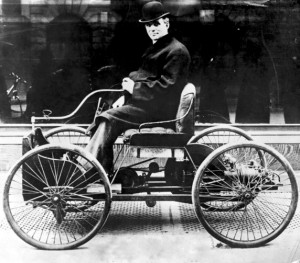Cooperation Among Strangers
Cooperation Among Strangers

We’ve all heard that the foundation upon which the United States economy was built is capitalism. Ask any person to define “capitalism” and in return you’ll get either a blank look or some ambiguous answer. If you look up “capitalism” in Merriam-Webster’s dictionary, here’s what you’ll find:
“An economic system characterized by private or corporate ownership of capital goods, by investments that are determined by private decision, and by prices, production, and the distribution of goods that are determined mainly by competition in a free market.”
Now that you’ve read the formal definition of capitalism, can you tell me in your own words what it means?
If you search for the word “capitalism” using Google, you’ll get 51,700,000 results. When you click on the Wikipedia link (the first of the Google results), you get a 28-page explanation of capitalism.
Despite the fact that the word is constantly being thrown around by politicians, journalists, commentators, and so-called experts, no one seems to understand what it really means. This is unfortunate. How can we be expected to defend capitalism if we don’t know what it is?
The best definition of capitalism that I’ve seen is from Dan Sullivan, the founder of Strategic Coach, a company that helps business owners develop and improve their own strengths and capabilities. Sullivan’s definition of capitalism is simple and straightforward. Here it is:
Capitalism is an ever-increasing system of greater cooperation among strangers.
That’s it. One sentence. Ten words.
To illustrate what Sullivan is talking about, let’s go back to 1976. The place was Los Altos, California, where two college dropouts, Steve Jobs and Steven Wozniak, got together and cooperated with each other to build a personal computer. They called their first computer the Apple I. You probably know the rest of the story. These two men launched the most creative and innovative company of the 20th century. You can’t go anywhere without seeing an Apple product, such as the iPhone, iPad, iPod, MacBook Air, or MacBook Pro. Apple started out as (and continues to be) “an ever-increasing system of greater cooperation among strangers.”
In 1896, Henry T. Ford created the Ford Quadricycle. He then went on to create and manufacture the Model T Ford automobile. What was it that built his company and launched what eventually became the worldwide automobile industry? It was an ever-increasing system of greater cooperation among strangers.
If you’re familiar with the Internet, you know about eBay and Amazon. Both of these companies have generated millions of dollars in revenue and are true representations of capitalism. Both companies were built upon ever-increasing systems of greater cooperation among strangers.
Jobs, Ford, and the founders of eBay and Amazon all eventually hired strangers (employees) to work for their companies. They borrowed money from strangers (investors) so they could build their companies. They sold to strangers (customers) who were anxious to buy and take advantage of their products and services. It was capitalism that made their success possible.
Unfortunately, most people think capitalism is primarily about money or capital. It’s actually more about trust and cooperation. Granted, if strangers who are cooperating with each other are successful, the end result is that they receive money for their products and services. But prior to money changing hands, they have to trust and cooperate with each other. It is only then that they can effectively create desirable products and services.
Generally speaking, capitalism doesn’t work in European countries because their legal systems are based on socialism which places unreasonable demands and limitations upon individuals who want to cooperate with each other to create new products and services.
In the Arab world capitalism doesn’t work for two primary reasons: (1) half of the people (women) aren’t allowed the freedom to express themselves and fully participate in the creation of products and services, and (2) the Arab people don’t trust strangers. The only people they trust are their own family members.
What is unique about the American culture is that in addition to being risk takers, Americans are very trusting when it comes to working with each other to create innovative products and services.
In order for capitalism to work properly, there has to be a legal system in place that (1) allows for the enforcement of agreements between strangers (contract law), (2) penalizes individuals for wrongdoing (criminal and tort law), and (3) keeps the government from encroaching on the freedoms and rights of individuals who desire to work together to bring products and services to market. In addition, there has to be a stable and predictable financial system in place to facilitate the development of new products and services.
Over the past 50 years (since the early 1960s), our legal and financial systems have deteriorated to such an extent that they have become unpredictable and unstable. We have reached the point where we now have an ever-increasing number of corrupt and lawless politicians, legislators, judges, and regulators whose sole purpose is to undermine our traditional legal and financial systems. Why? So they can exercise more power and control over us and become wealthy through the theft of our money and property. As a consequence, the foundation upon which our economy was built – capitalism – is now in jeopardy.
So how do we get out of the mess we’re in right now? In my opinion, we need to return to the Judeo-Christian values that were the foundation upon which our country was established and built – values that have historical roots in both Judaism and Christianity.
Judaism is a religion that was developed among the ancient Hebrews and characterized by belief in one transcendent God who revealed himself to Abraham, Moses, and the Hebrew prophets. It is a religion that is still practiced by the Jewish people in accordance with scriptures and rabbinic traditions.
Those of us who are Christians know that Christianity is a religion that was derived from the teachings of Jesus Christ, the son of God. It is a religion based on tradition and the bible (sacred scripture) and is professed and taught by Eastern, Roman Catholic, and Protestant organizations.
The Judeo-Christian values include honesty, integrity, temperance, humility, courage, industriousness, sincerity, self-denial, and chastity. Unfortunately, those values are no longer taught in our public school system. In our modern culture, many of our leaders and citizens have replaced those proven values with dishonesty, greed, jealousy, envy, anger, revenge, laziness, impulsiveness, defiance, over-indulgence, and impurity.
We know from history that our Founding Fathers believed in and practiced Judeo-Christian values. Those values influenced their declaration that we are all created equal in the eyes of God and provided the pillars upon which our legal and financial systems where built. They also allowed for the explosive economic growth of our country.
If we ever hope to return to a time where we have stable legal and financial systems in place along with a dynamically growing economy, we first need to return to the value system upon which our country was built. No legitimate legal or financial system can survive without the majority of citizens committed to and practicing the values of our Founding Fathers.
Something to think about as we celebrate the 236th birthday of our great nation.




2 Comments
on July 10th, I jusy finished 60 emails
Once again, thank you, Harry, for a well expressed writing – I’m behind in getting these emails up, so,
…see how the lines jump on me – new laptop is hard for me to control! Blessings – Sister Roberta
GREAT read. Although it would have been nice to see you leave religion out of it even with the interesting religious insights. I love Dan’s definition which is how I found your post.